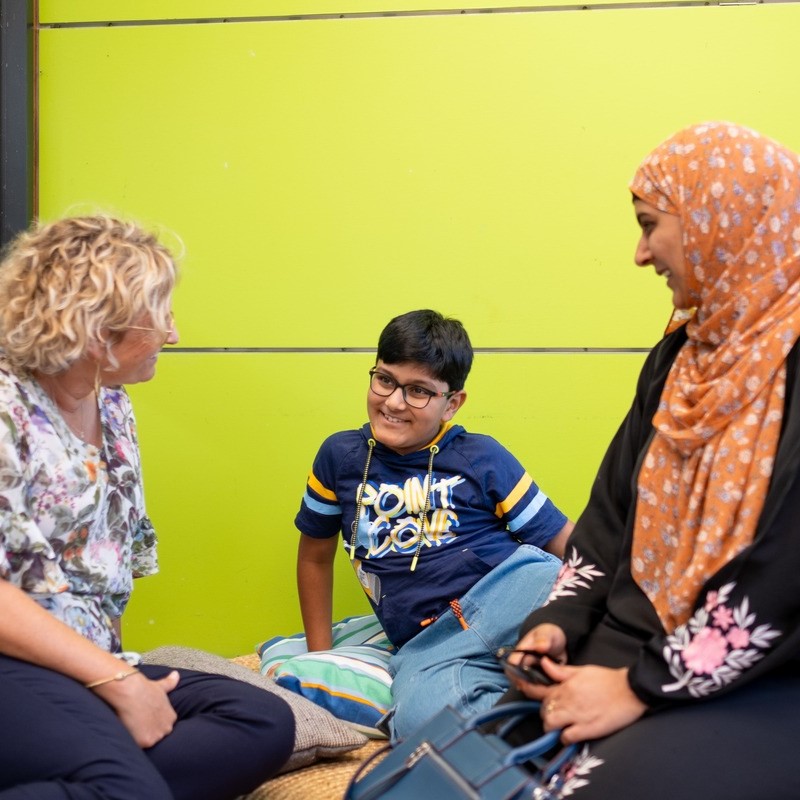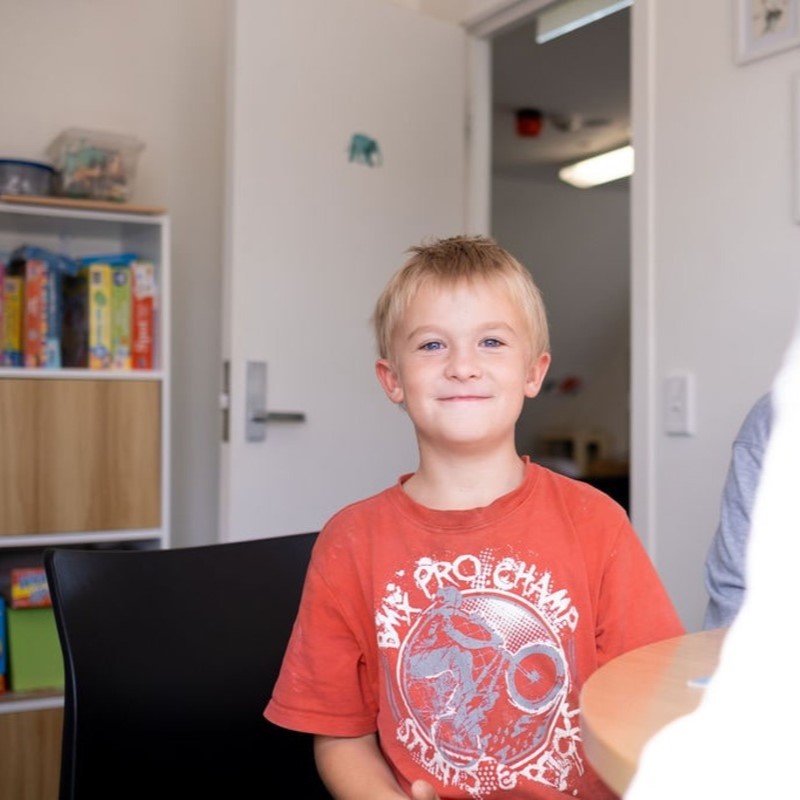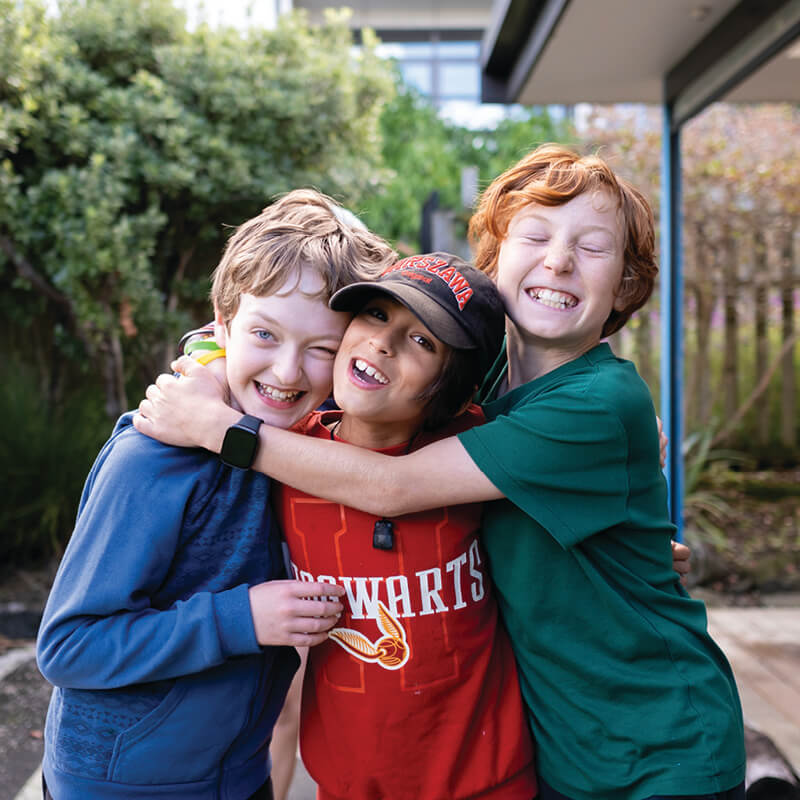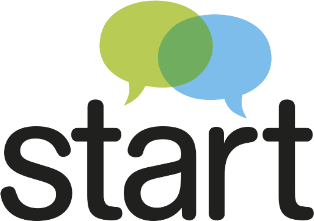Supporting Kids & Teens
Find help and support for your child or teenager navigating their stutterIf your child is struggling to get their words out, it’s understandable to feel concerned. It can be especially challenging if stuttering is making interactions with peers difficult. We get it. And we can help.

Stuttering At This Age
As tamariki grow up, their stuttering journey can become more complex – they start to notice it more and it might affect them in different ways. Your child’s experience of their stutter is unique – they might feel really bothered by it and have lots of big emotions or they might take it in their stride.
As their parent, you’re probably feeling a shift too – maybe you’re worrying about how it’ll impact your child at school or with their friends.
It’s totally normal to have different feelings about stuttering than the feelings your child has. And for you both to be struggling to come to terms with it.
We understand and we’re here to support you.
Ki te Kotahi te kākaho te whati, ki te kāpuia, e kore e whati
When a reed stands alone it can easily break, but when bound together it is unbreakable
How You Can Help
As a parent, it can be tough knowing how to help your child or teenager – but there are things you can do that’ll make a big difference.
We’ve put together some suggestions that give you a good starting point – How to support your child or young person who stutters:
If your child is really struggling with their stutter and it’s causing them problems in different areas of their life – or if you’re just feeling a bit lost about how to support your child, therapy could be a good next step.

What Does Therapy Look Like?
Therapy is specifically tailored to your child’s needs and involves your whānau too. We help your child to understand their stutter better, feel more confident when they talk, and get the support they need from those around them. It’s like giving your child a set of extra tools to help them deal with their stutter and feel more comfortable in their own skin.
We’re here to provide you and your child with all the support you need. Whether it’s through individual therapy sessions, groups, courses, or social events, our aim is to create a supportive environment for kids and teens who stutter.
No matter where you are in Aotearoa – we’re committed to helping your child or teen. If you’re in Auckland you can see us in Greenlane for face-to-face sessions. But don’t worry – if you live somewhere else in Aotearoa – we can see you via Zoom. About 30% of the kids and teens we support live outside of Auckland, from Kerikeri in the North to Invercargill in the South. So, we’ve got plenty of experience with Zoom therapy, and most kids and young people find it works really well for them.
Cost of Sessions
As a charitable trust, we’re committed to ensuring that our sessions and other services are accessible to everyone. That’s why we keep our rates as affordable as we possibly can. Our standard charge is $75 per session with a reduced rate of $55 for Community Service Card holders, tertiary students and senior citizens. However, if the cost is still an issue for you, please get in touch with us. We’re here to help and we’ll adjust the rate to ensure you and/or your child receive the support you need without undue financial strain.
Our sessions are heavily subsidised. If you’re in a position where you can contribute more than the standard fee, we’d be incredibly grateful for your support.
Frequently Asked Questions
Does my child need to attend the first appointment?
Ideally, we would like to see both you and your child at the appointment – both in person and online.
For online appointments, if your child is hesitant to join the call or speak with the speech language therapist, that’s ok! We won’t put pressure on your child to join or to speak. If needed, video recordings can be a helpful way to hear your child’s talking.
In some cases, parents are wanting support for themselves and may attend appointments without their child.
Do parents and whānau need to attend the appointments?
Yes, we ask that parents attend the first appointment with their child, and in most cases all ongoing appointments. Parents play an important role in supporting their child with their stutter.
Some teenagers may choose to attend therapy sessions on their own. This will be agreed with your speech language therapist after the first appointment. For teenagers who do attend on their own, parents will be kept updated by email and it’s recommended that they attend every few sessions or for the last 5-10 minutes of the session.
What happens during the first appointment?
The first appointment is a chance for our speech language therapist to meet you and your child, and to learn about how your child is getting on more generally and with their stutter. The speech language therapist will speak with both you and your child about their stutter. Every child and teen is different in how much they interact and share with the speech language therapist, so we’ll follow their lead and not put pressure on them to speak. Your speech language therapist will talk to you about how they can help support your child.
What if my child doesn’t stutter during the appointment?
It’s no problem if your child doesn’t stutter during the appointment. Their talking during the appointment is a small snapshot of their talking on that particular day, and as we know stuttering often fluctuates. Our speech language therapist will ask you how their talking in the appointment compares to what it’s typically like, and may ask you to share video recordings from home.
How do I talk to my child about the appointment?
Most children 6 years and older will be aware of their stutter, and some may have even asked to get some help. You could say “We’re going to talk to someone who can help us with your stutter/your talking”.
Is START our only option for speech-language therapy?
START is the only organisation in Aotearoa New Zealand that specialises in providing therapy and support for people who stutter. However, there are other options for accessing speech language therapy:
- Ministry of Education: Children may be eligible to see a speech-language therapist (SLT) through the Ministry of Education. You can ask your child’s early childhood centre or school about making a referral. This is a free service, however please note there may be a wait time for this service.
- Private SLTs: You may also consider seeing a private SLT. We recommend choosing someone who is registered with the New Zealand Speech-language Therapists’ Association (NZSTA) and has experience working with people who stutter.
- University clinics: Universities that train SLTs also offer clinic services, where student SLTs work under supervision. You might see an SLT and/or a SLT student under supervision. Clinics are available at Massey University, the University of Auckland, and the University of Canterbury.
If you’re unsure which option might be best for your situation, feel free to get in touch—we’re happy to talk with you about this.
William’s Story
Living in Wellington, I really wasn’t sure how a Zoom based session would work. I had few expectations, but was genuinely curious as to what stuttering therapy would involve. We worked with Chris over a period of about 4-5 months and it was evident from the start that he knew how to build rapport with my child and built trust in the process we would go through. We learnt a lot about stuttering, how my child was experiencing and felt about it, and of course various techniques to try out.
Learning more each week about stuttering meant that we realised after a while that the main sign of success
“We worked with Chris over a period of about 4-5 months and it was evident from the start that he knew how to build rapport with my child and built trust in the process we would go through.”
was more about our child learning acceptance that he had a stutter, and some confidence in knowing what he could do to better manage it. We finished our sessions on a high and I’m also grateful that if needed we can have more sessions again in the future.”
– Liz (mum of William)
Groups, Courses & Social Events
Your child is unique, but not alone. Your child may not have met anyone else who stutters. We know that meeting others who stutter can be life-changing so we offer a range of safe spaces for your child to meet others of a similar age.

Confident Communicators Group
A fun and supportive group for children aged 7-10 years and their whānau to explore stuttering, build confidence and connect with others
The next Confident Communicators Group will be held in 2026.

Strong Voices
Due to availability of the START team, we’ll be offering a two day rather than three day course in July 2026.
Wednesday 15th & Thursday 16th July 2026

Come Be Do
Held in the April and September/October school holidays.
2026 Dates – Thursday 16th April & Thursday 1st October 2026
Stuttering: Young Kiwis Share Their Stories
We created this 15 minute film specifically to help New Zealand teachers gain a deeper understanding of the unique experiences of young Kiwis who stutter. 11 young people ranging from 9 to 18 years old open up about their experiences of stuttering – both in and out of the school environment. Watching this film will give you valuable insights into what it’s like for tamariki and rangatahi who stutter, and you’ll come away with some practical ideas of how you can help them.
“This video is excellent. I wish my son had been able to see this 20 years ago! The young people speaking in it are so articulate about the issues around having a stutter and the video should be shown in all schools. Speaking as an ex-teacher, I would have found it so valuable and helpful”
– Claire Woods
My Stutter
“This is a wonderfully insightful book. Elena has never been able to verbalise exactly what she feels when her words ‘get stuck’. And although it was easy to see the pain and frustration she was feeling, it has been interesting for me to read how some of the children have described their experiences. Elena is now almost 8 and every now and then her words still get stuck, and I think her stutter (although very minimal now) will probably be part of her life for the rest of her life. It’s been heartwarming to read how optimistic some of the contributions are, which gives me hope that my daughter will be just fine, even if her stutter will accompany her through life. I work as a teacher aide at a primary school, and I’ll be sharing the book with all the teachers and teacher aides at my school”. Linda (mother of Elena)
Let’s chat!
If you want to have a kōrero with one of our team about your child’s stuttering and explore whether therapy or social support could be beneficial.
You’re not alone in this – our team is here to support you.

